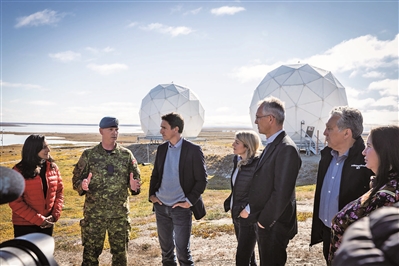
By Fu Bo
As global warming and global competition intensify, NATO, led by the US, is preparing to open up a new "battlefield" and increase its military presence in the Arctic. Recently, NATO countries have adopted various measures to "strengthen their presence" in the Arctic, which has aroused the alarm and dissatisfaction of Russia and other countries. In this context, the strategic game in the Arctic may be further intensified.
NATO steps up high-profile activities in the Arctic
NATO countries have "strengthened their presence" in the Arctic region mainly from two aspects.
First, NATO Secretary General's first visit to the polar regions. On August 25, local time, NATO Secretary-General Jens Stoltenberg, visited Cambridge Bay in Nunavut accompanied by Canadian Prime Minister Justin Trudeau. The NATO website published an article stating that this is the first visit by a NATO secretary-general to the Canadian Arctic. Stoltenberg said that the Arctic is the fastest route for Russian missiles to attack the US and is critical to safeguarding NATO's collective security.
Second, the US appointed its first Arctic ambassador. On August 26, the US announced plans to appoint the Arctic ambassador. If this plan is implemented, it will mark all those eight Arctic countries including Canada, Denmark, Finland, Iceland, Norway, Russia, Sweden, and the US, having ambassadors in the Arctic. It is reported that the US Arctic ambassador will be responsible for promoting US policy in the Arctic region, communicating with other countries and indigenous peoples, and maintaining close cooperation with US institutions, businesses, and government departments.
Different responses from the outside
The outside world has reacted differently to NATO's recent continued moves in the Arctic.
NATO countries showed "unity". Regarding Stoltenberg's visit to the Canadian Arctic, the Canadian Press commented that Ottawa's long-standing "resistance" against NATO's excessive involvement in its Arctic affairs seems to have loosened, even though Canada has not fully opened its doors. Andrea Charron, an expert on North American security at the University of Manitoba in Canada, believes that Stoltenberg's visit to the Arctic is more of a symbol of unity within NATO than an actual signal.
Russia condemned. In response to Stoltenberg's remarks that "NATO wants to expand its deployment in the Arctic because Russia's military capabilities in the north pose a strategic challenge to NATO," Russian Presidential Press Secretary Dmitry Peskov said that Russia regards NATO's remarks as NATO's willingness to confront Russia in the Arctic. Konstantin Kosachev, Deputy Chairman of the Federation Council of the Russian Federation, said Stoltenberg's remarks were a threat to Moscow's interests. He also noted that NATO's military activities in the Arctic have more than doubled in the past five years and have threatened the security of the region.
Game in the Arctic may intensify
NATO's recent initiatives in the Arctic mainly focus on the great strategic value of the polar region and it aims to turn it into an area for NATO's values and interests. In the future, as NATO's involvement continues to increase, the strategic game in the Arctic may become more intense.
Strategic containment may intensify. It is believed that the US, the UK, Germany, France, and other NATO countries, as well as the EU, have proposed their own Arctic strategies. Currently, among the eight members of the Arctic Council, only Finland, Sweden and Russia are not NATO member states. Next, Finland and Sweden will join NATO and will strengthen NATO's influence in the Arctic region. By then, Russia will be "surrounded" by NATO countries in the Arctic Ocean. As NATO continues to strengthen its military presence in the Arctic, the Arctic is becoming a new confrontation ground between Russia and NATO.
Military confrontation may escalate. It is worth noting that the competition of relevant countries for the Arctic is changing from resource competition to a military game. The new National Defense Strategy released by the US Department of Defense regards the Arctic as a "defense priority" and stressed its importance to US national security. In June, the US Army formed a new airborne division, the 11th Airborne Division based in Alaska, to specialize in Arctic operations. The Russian Northern Fleet announced that it will conduct military training in the Arctic region on August 10, local time. In the future, the military conflicts between the US and Russia in the region may further be intensified, and we should pay close attention to relevant trends.













